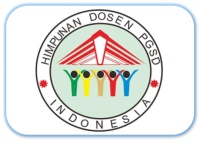Peningkatan Hasil Belajar Siswa Menggunakan Pendekatan Konstruktivis pada Pembelajaran IPS Kelas V SD Negeri
Abstract
This research is done due to teacher’s lack of innovation in the learning process. Thus, the student are easily bored and are not actively participated in the process. This research aims at describing the improvement of the students’ learning outcomes of social science subject by using the Constrictivism Approach at class V of SDN 38 Api-Api Kecamatan Bayang. This class action research applied both qualitative and quantitative approaches. It was conducted in two cycles. Each cycle consisted of our phases planning, implementation, observation, and reflection. This subjects were 20 students of class V of the school. There are tree results of this research. First, the score of the lesson plan increased from 82.1% in cycle I to 92.85% in cycle II. Second, in term of the teacher’s activity, the score enhanced from 78.75% to 95%. Meanwhile, the score of the students’ activities increased from 72.5% in cycle I to 92.5%. Third, the students’ learning outcomes enhaced from 74.31 in cycle I to 90% in cycle II. Thus, it is concluded that the constructism approach successfully improves the students’ learning outcomes of the Social Science subject.
Keywords: Learning Outcomes, Construtivism Approach
References
Arikunto, S.(2002). Prosedur penelitian suatu pendekatan praktik. Jakarta: PT Asdi Mahasatya.
Depdiknas. (2006). Kurikulum tingkat satuan pendidikan. Jakarta: Badan Standar Nasional Pendidikan.
Hamalik, O. (2011). Proses belajar mengajar. Jakarta: Bumi Aksara
Muhaimin, S dan Sugeng L. 2009. Pengembangan model kurikulum tinkat satuan pendidikan (KTSP) pada sekolah & madrasah. Jakarta: Rajawali Pers.
Mulyasa. (2008). Implementasikurikulum tingkat satuan pendidikan, kemandirian guru dan kepala sekolah. Jakarta: BumiAksara.
Nana S. (2005). Media pengajaran. Bandung : Sinar Baru Algensindo.
Nasrul. (2014). Penggunaan model pembelajaran cooperative learning tipe student team achievement division (STAD) untuk meningkatkan aktivitas dan hasil belajar IPS di kelas III SD negri 16 tanjung aur kota padang. Jurnal Ilmiah Ilmu Pendidikan. (14), 2, 39.
Ngalim, P. 2006. Prinsip-prinsip dan teknik evaluasi pengajaran.Bandung: PT Remaja Rosdakarya.
Permendikbud Nomor 81A Tahun 2013, Implemenasi kurikulum, lampiran IV. Pedoman umum pembelajaran: Jakarta.
Sukma E dan Ahmad J.S. (2016).Kompetensi kognitif pembelajaran apresiasi sastra di sekolah dasar.Jurnal Penelitian Bahasa dan Sastra Indonesia, 1 (2), 2.
Suryobroto. 2009. Proses belajar mengajar di sekolah. Jakarta: Rineka cipta.
Trianto.(2011). Mendesain model pembelajaran inovatif-progresif. Jakarta: Kencana.
Wina, Sanjaya. (2008). Strategi pembelajaran beriorentasi standar proses pendidikan. Jakarta: Kencana Prenada Media Grouf.
DOI: http://dx.doi.org/10.24036/e-jipsd.v6i2.3566


